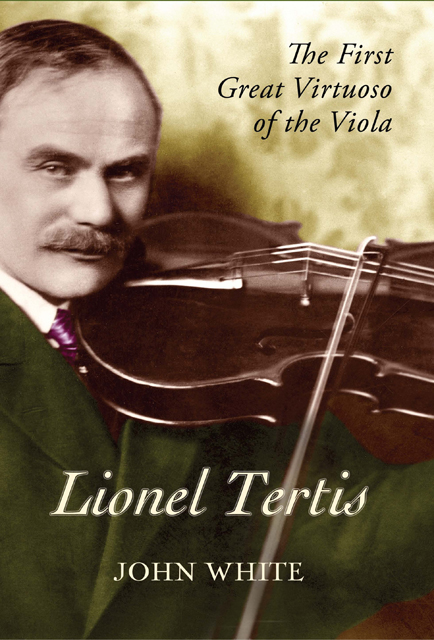Book contents
- Frontmatter
- Dedication
- Contents
- List of illustrations
- Foreword
- Preface
- Acknowledgements
- 1 The Tertis Family
- 2 Early Career
- 3 The Great War
- 4 The Chamber Music Players
- 5 American Tours
- 6 Return to the Royal Academy of Music
- 7 The Elgar and Walton Concertos
- 8 The BBC Orchestra, Delius, Bax and Vaughan Williams
- 9 A Shock Retirement
- 10 The Richardson–Tertis Viola
- 11 The Second World War
- 12 Promoting the Tertis Model Viola
- 13 Return to America and Eightieth Birthday Celebrations
- 14 Second Marriage and Last Appearance
- 15 TV Profile and Ninetieth Birthday
- 16 Final Years
- Notes
- Appendix 1 Tertis’s Violas
- Appendix 2 The Tertis Model Viola
- Appendix 3 Tertis’s Writings and Talks
- Appendix 4 Tertis’s BBC Appearances
- Appendix 5 Tertis’s Honours
- Appendix 6 Music with Tertis Connections
- Appendix 7 The Tertis Bequest
- Appendix 8 The Tertis Legacy
- Discography
- Bibliography
- Index
4 - The Chamber Music Players
Published online by Cambridge University Press: 18 March 2023
- Frontmatter
- Dedication
- Contents
- List of illustrations
- Foreword
- Preface
- Acknowledgements
- 1 The Tertis Family
- 2 Early Career
- 3 The Great War
- 4 The Chamber Music Players
- 5 American Tours
- 6 Return to the Royal Academy of Music
- 7 The Elgar and Walton Concertos
- 8 The BBC Orchestra, Delius, Bax and Vaughan Williams
- 9 A Shock Retirement
- 10 The Richardson–Tertis Viola
- 11 The Second World War
- 12 Promoting the Tertis Model Viola
- 13 Return to America and Eightieth Birthday Celebrations
- 14 Second Marriage and Last Appearance
- 15 TV Profile and Ninetieth Birthday
- 16 Final Years
- Notes
- Appendix 1 Tertis’s Violas
- Appendix 2 The Tertis Model Viola
- Appendix 3 Tertis’s Writings and Talks
- Appendix 4 Tertis’s BBC Appearances
- Appendix 5 Tertis’s Honours
- Appendix 6 Music with Tertis Connections
- Appendix 7 The Tertis Bequest
- Appendix 8 The Tertis Legacy
- Discography
- Bibliography
- Index
Summary
William Murdoch and The Chamber Music Players
During the latter part of the First World War Tertis's recitals brought him into close contact with the Australian pianist William Murdoch, who was to be the linchpin of one of the great British chamber music groups. From the point of view of posterity, it was the most important ensemble that Tertis played in, because – although the group as a whole did not leave recordings – he made records with some of its members. As he wrote:
My next venture in ensemble playing was of a more or less permanent nature, and took the shape of another piano quartet: Albert Sammons the leader, William Murdoch pianist, Felix Salmond cellist and myself. My wife christened us with the splendid title of ‘The Chamber Music Players’. We made music together for the best part of 22 years with only three changes (all cellists – Arnold Trowell and Cedric Sharpe followed by Lauri Kennedy in place of Felix Salmond who had gone to America). Some of the happiest hours of my life were spent with these good friends and excellent musicians.
Born in Bendigo, Victoria, in 1888, William Murdoch came to the Royal College of Music on a scholarship before the war, and may well have encountered Tertis there. In 1911 he went on tour to South Africa as Clara Butt's accompanist; he then spent three years touring the world as a recitalist. He quickly became well known as a Beethoven player. Early in 1916 he was introduced to Albert Sammons by a mutual friend, Viscount Coke, then a captain in the Scots Guards. In May that year Murdoch and Sammons were conscripted into the army; both joined the Grenadier Guards as bandsmen. In their spare time they began giving recitals together, and eventually Murdoch and Tertis began appearing together as well.
The Chamber Music Players – consisting of Murdoch, Sammons, Tertis and Felix Salmond – grew out of these contacts. It was this group, though with Raymond Jeremy instead of Tertis, that gave the first private performance of Elgar's Piano Quintet and String Quartet, with the composer's close friend W. H. ‘Billy’ Reed as second violinist, at Frank Schuster's house on 26 April 1919. The same musicians gave the public premieres at the Wigmore Hall on 21 May, with Sammons and Murdoch adding the Violin Sonata.
- Type
- Chapter
- Information
- Lionel TertisThe First Great Virtuoso of the Viola, pp. 43 - 53Publisher: Boydell & BrewerPrint publication year: 2006



